|
restoring our biblical and constitutional foundations
|
Chapter 4: Early Marriage
When I said “I do” at the age of 23 to David Alan Black, I knew there would be no “and they lived happily ever after.” I had lived long enough and had seen enough of the world’s reality not to believe everything that came out of Hollywood. But I did have the assumption that if things were “done right,” then everything would turn out OK. In other words, if the correct formulas were applied to a given situation, then God somehow would wave the correct wand to cause the desired outcome.
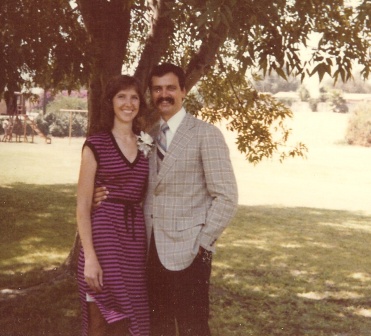
Our marriage took place when Bill Gothard and his Basic Youth Conflicts was all the rage. He presented formulas for every possible scenario in life. It was all so neatly packaged, accompanied by appropriate verses, diagrams and testimonials. I do not deny that there was truth in his material. But the role of the Holy Spirit and the whole counsel of the Scriptures were minimized in favor of these formulas. The end result was a life of works, founded upon man’s spiritual reason and self-discipline. Without realizing it, I got sucked into that approach to life. Something about its order and neatness appealed to me.
A second influence upon my early marriage was the family in which I had been raised. Every couple is heavily influenced by the families in which they were reared. In my own family, there had been no active rebellion among the children and my parents seemed at peace with each other. All around us were young people from good homes chucking everything to join the drug scene, live in hippie communes, or go all out for a “free” lifestyle. Yet there was none of that in our Lapsley home. We chocked it up to our missionary background and our relatively poor, simple lifestyle.
The final influence upon me as a young bride was Christian psychology. It was a new discipline that was just breaking the “ungodly” label-barrier. For a long time, anything psychological was labeled as being against God. But by the time of my marriage, some Christian pop-psychology guidance books were gaining momentum. One of these was Design for Christian Marriage by Gary Smalley; it became my handbook.
So as I entered marriage, I was guided by these 4 things:
1) God was in me, and He could make me to be a good wife and mother.
2) I should trust my instincts.
3) If I got the right understanding (formula), then the natural consequence would be success.
4) I should aim for a natural, simple, holistic lifestyle; I should cut out the worldly influences that lead wives and children astray.
Dave and I were very different. He was third-generation from Hawaii, although he had no actual Hawaiian blood in him. His mother divorced his father when he was only 3 years old, so he never knew his father. His father, grandfather, and uncles were alcoholics. He grew up in rented houses and apartment complexes, and ate left-over food from the public school across the street. They did not own a car; in fact, his mother did not have a driver’s license. He spent 365 days a year surfing all the surf spots on the island of Oahu, including the 30-footers of the North Shore. (His cousin died of a broken neck when surfing.) He was the youngest of four children and grew up basically spoiled rotten. His mother worked hard as a secretary trying to support all of them, so she was not there for discipline and training. At the age of 8, Dave and his mother followed his older siblings to a church meeting for their baptism. The next week they went back and began attending First Baptist Church, Windward. One Sunday evening Dave walked forward to express his desire to take Jesus as His Savior; his mother walked right behind him. That year the whole family was birthed into the Kingdom.
At about the age of 14, the full horror of the divorce and his lack of a father hit him. Also, it dawned on him that people in the church who claim to be Christians do not always act like Christ; this hypocrisy hurt him deeply. So he left the church, preferring to spend his Sundays at the beach. His hair grew long, and Saturday evenings were spent playing trumpet in a rock band at a club. But our Lord is also the Lord of the beach. Psalm 139 emphasizes that no matter how far we run, we are never beyond His presence. The beach was His creation, and His Gospel penetrated that beach one morning in the voice of a street preacher. He was part of a broad group of Christians who were disillusioned with the formal, sit-in-a-pew-and-be-quiet church group. They called themselves “Jesus Freaks.” They had hearts of pure desire to follow Jesus, though in some ways they disregarded His teachings of grace towards those who are different (i.e., the “establishment”). For Dave’s part, as he listened to the Gospel with new ears, his heart responded, and for a period of time he had his church service on the beach with the other Jesus Freaks. He devoured the Scriptures. He drank in its teaching. He saw his true Father as never before. At long last his thirsty, hurting, confused soul was receiving the fresh water and healing balm of the Truth of Jesus. At age 16 he realized that he himself was a “hypocrite” and he had no right to judge those who met in church buildings. So he renewed his relationship to First Baptist Church, Windward, and became the choir director and youth pastor. He had only one goal in life: to know God as Father. After graduation from high school, he spent one year at the University of Hawaii, then moved to La Mirada, California, to join the other Bible majors studying for Christian ministry.
His desire to teach Greek is another interesting story of the sovereign design of the Lord. To get his bachelor's degree in Bible, he was required to take 2 years of Greek. He could barely speak decent English; the pigeon-English of Hawaii kept breaking through! The idea of learning a foreign language scared him. Dave postponed his Greek requirement until his senior year. In the fall of his senior year, he enrolled in the first of 4 Greek classes. Everyone knew the philosophy of Dr. Sturz, who taught the Greek courses: Be really hard the first 3 weeks, weed out the weak students, and then continue on with the course. Dave was one of those weeded out. He considered changing his major, like so many others, from Bible to Christian Education, which did not require Greek. Instead, he enrolled in the Greek correspondence course of Moody Bible Institute. At lightning speed, he passed the first two courses, making an “A” in each of them. Then he returned to Dr. Sturz at Biola for the last 2 courses. He graduated in June 1975 and began teaching 11 hours of Greek for Dr. Sturz a year later! Over the following decades Dave would not only teach Greek fulltime internationally, he would also write what was to become a best-selling first-year Greek textbook. That textbook, and many other books, would be translated into many languages and used around the world, even in “closed” countries, in both "Christian" and "secular" universities. This is the sovereign grace of the Lord in directing the work and ministry of Dave.
So here we were: an MK married to a surfer, a multi-generational Christian married to a first-generation Christian, an international traveler married to an island boy. God could not have brought two more different people together. But we were united in our love of the Lord Jesus and our strong commitment to obey Him in everything. (And that made all the difference in the world! So many today are concerned about “compatibility.” Put Jesus in the center of the relationship and all the compatibility issues will work themselves out!)
On a hot, muggy evening in early August, 1976 Dave had framed his proposal to me in this way: “I believe the Lord wants us to get married. Do you agree?” That foundation for our marriage brought stability in many rough years. His proposal was not based upon his love or emotions or sensual sparks; it was based upon a sense of the Lord’s appointment. However confused we could get in figuring out this marriage thing, we always knew that His hand was upon us and would hold us.
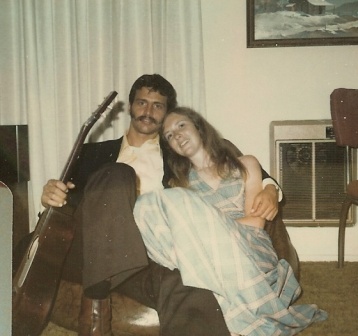
Our heart goal was to be obedient to the Lord Jesus, but how to figure out what “obedience” meant was the stumbling block. The Evil One, the Enemy of our souls, is in the business of destroying the good that God is doing. His Number One tactic is confusion, distraction, deception, blurred vision. He rarely fights his fight openly; he rarely comes face-to-face with us, daring us to put up our dukes. No, he does more guerrilla warfare -- subtle, camouflaged striking when we are confident or comfortable.
Over the next 2 decades of my life, I was to discover that much of what I considered “obedience to God” was really “obedience to tradition” or “obedience to Churchianity” or “obedience to Christian psychology.” There was little room in all of these substitutions for the guidance of the Holy Spirit, for true humility before God, for grace in spirit, and for tolerance in lifestyle. There was little room for trusting the character of God in simple obedience to Scripture. Although I loved the Lord with all my heart, and was wholly committed to obeying Him, and was utterly confident of His love and commitment to me, the practicality of life under the guidance and power of His Spirit largely escaped me. I was largely living by my own strength and wisdom, springing from my traditions, my upbringing, and my readings.
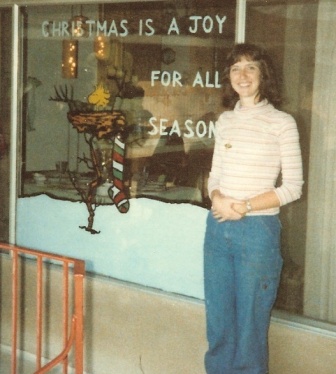
The first goal in our marriage was to get Dave's education completed, so that he could begin his life's work. Education meant a lot to Dave. He was the first one in his family to graduate from college, and his sights were set high in the educational arena. After graduating from Talbot Seminary with an M.Div, he set his sights on a doctorate degree in Europe.
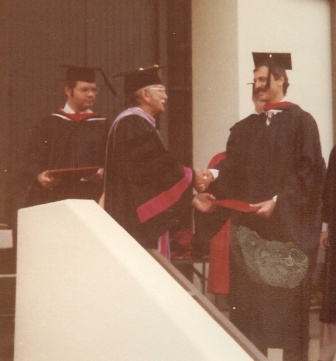
As his wife, my role was to encourage him and to work as hard as I could to gain the funds needed for the schooling. Dave was accepted to work under Dr. Bo Reicke at the University of Basel in Switzerland.
It was a 3-year program that was focused upon research. Attending classes was strictly optional; knowing all the languages needed for a doctoral research project was not. So while I worked 36 shifts per month at the hospital, Dave worked hard learning German, French, Greek, Latin, Italian, Dutch, and Spanish. At this time there was a severe gas shortage. In California, the governor declared that we could buy gas only every other day, according to the last number on our license plate. I don't remember if we were even or odd, but when we pulled into the gas station, whatever our number, it had to match the even or odd day of the month. Dave would get up at 2:00 a.m. on our day for gas, park the car at the gas station, being the 1st or 2nd in line, then go across the street to an all-night coffee shop; he would study his languages while he waited for the gas station to open up.
In addition to learning all these languages, he did his initial research to begin to choose the topic of his dissertation. So he travelled to lots of different libraries in the Southern California area. This was in the day before computers, so he had to physically travel to a library and open a book. He worked hard to prepare himself for his doctoral studies, all the while taking 11 units in the Master's program at Talbot Seminary and teaching 11 units of Greek at the college level at Biola. So, 1976-1980 found us working and focused on Dave's doctoral preparation. In May, 1980, we moved to Switzerland.

The government required us to have in hand the funds needed for 3 years of study. At that time, meat in Switzerland was 4 times the price of meat in the USA, and vegetables were 3 times the price. We rented a one-room apartment with a small kitchen and bath attached. The kitchen was so small; I barely had space to turn around! When guests came, I greeted them "Would you like to sit at the table or on the bed?" (It was funny!) One large wall of the apartment was solid glass, overlooking a garden; it was wonderful! Immengasse 18 was our address. The landlady was older than us; she was of the generation that still remembered the role of the USA in defeating Hitler during WWII, and she was happy to rent to us to prove her appreciation. (The younger generation, however, had a love-hate relationship with Americans; they seemed to envy our carefree, happy attitude about life, yet they hated our world dominance.)
Dave attended every class he could at the University. They were all in German. And by the winter 1980-81 he had begun to write his dissertation! By June 1981, he had completed the prospectus and had written his first chapter! He was gone to the university almost every day, all day, except on Sundays. Sunday was our day, and we shared it with a delightful fellowship of believers called the Baptistengemeinde.
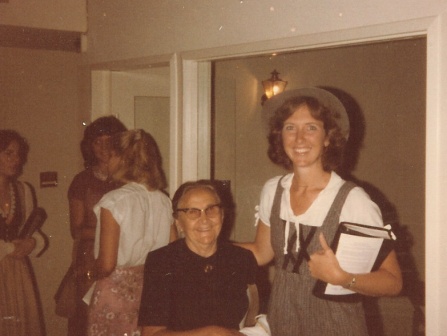
In Switzerland, the population had to declare to which church they belonged: the Reformed or the Catholic. And when they paid their income taxes, they also paid their “tithe”; the government collected the tithe and forwarded it to the appropriate church system. The "free" believers were those that did not belong to either of these church systems. These included the Mennonites, the Baptists, the Pentecostals, etc. These were usually very small congregations. Each believer had to decide whether or not to declare a church system and pay the required tithe to that system, or to declare himself "free church." I know for a fact that this was a difficult decision; somehow the word got out to neighbors and community leaders if someone was "free," and much persecution followed. Some of the little children in our Gemeinde suffered public ridicule or shunning in their schools because they were known to be "free." But if these people paid the government tithe, it was OK for them to attend a free church. It was the money trail, not the doctrine, which was of concern.
For myself, this year was largely a year of rest. I spent long hours typing Dave's dissertation on a manual German typewriter. I was typing words that I didn't understand in all these languages, and I had to learn a new arrangement of the keyboard. We used the typewriter in the office of an Olds Folk's Home run by our little Baptistengemeinde. Otherwise, I devoted myself to learning German and to quilting. An elderly lady named Frau Schaub gave me German lessons every week. She and her husband had survived the War, but were filled with bitterness at the cost to them and their country. She loved to garden and went cross-country skiing for 10 days every January -- even at the age of 75! One day as I was having my German lesson with her, a friend of hers stopped by; they had been working in their back yard garden and had dug up an ancient Roman column! This close connection to ancient things was part of our life in Switzerland. We routinely passed building after building with dates of 1000 or 1100 over their low doors. We walked through the old "Tor" (gate) getting from our apartment to the central city where the university was. We took a boat ride down the Rhine River to an old Roman colony, complete with amphitheater, baths, boulevards, etc. The first Saturday of every month was a huge garage sale in Petersplatz. It was here that I found someone selling some ancient Greek and Roman coins; I bought them for Dave for his classes.
The winter months in Switzerland were terrible. We didn't go into the beautiful countryside to go skiing. Our world was the drab gray of old buildings, freezing rain, dirty snow, and centrally-controlled thermostats. Our landlady controlled the thermostat for the whole building. It was turned on at the end of October, and it was turned off in March. I would get cold to the bone! The only way I could warm up was to soak in a tub of water up to my neck, then dry quickly and rush into bed. Depression was commonplace among the people during the winter months. I built my own happy time in our little apartment by quilting. I had taken all the fabric and patterns to make quilts. One of my favorite designs was called Grandma's Fan. I made it in variations of pink, and gave it to my sister Lisa as a college graduation present. It was on display at a “patchwork” shop in downtown Basel for many months. One person offered me $600 to buy it, but it was already given to my sister. In addition to quilting, during the long hours when Dave was at the university and the weather was soooo cold, I practiced piano. For Valentine's Day in 1981, I played all three movements of Beethoven's Moonlight Sonata for Dave. That was quite an accomplishment!
I say that this time in Switzerland was largely a time of rest, but there was one great work project that I did. It was an emotional and spiritual work. It has been my observation that every person must look back at the shortcomings of their childhood and must make peace with the perceived (or actual) wrongs. There is no such thing as a perfect childhood; there is no such thing as perfect parents. Sin has ravaged the entire spectrum of human existence, including those “innocent” days of childhood. Part of growing into mature adulthood is to accept and deal with the effect of sin upon those innocent years. In my observation, this “journey” happens sometime between ages 15 and 30. For me it hit in the years just before our departure to Switzerland. Many, many hours were spent crying out my pain; countless times I vocalized things to a caring husband who did his best to be a sounding board. I tried talking to my parents, but the full thrust seemed lost on them.
I will never forget the day that I was sitting alone in our one-room apartment in Basel, and the Lord spoke to me in His gentle yet authoritative Voice. "Forgive." It was that simple. No need to understand; no need to question “why”; no need to demand that others feel my pain. The Lord who knew it all and understood it all gave me the simple answer: Forgive.
Forgive is a bookkeeping term. It means to cancel a debt. Practically speaking, it means that the wrong someone has done to me is no longer demanding that restitution be paid. It is a choice of the will, not a negation of emotion. To choose to forgive means that no longer can I look to the villain to “repay” me. The accounting balance has moved from “Accounts Payable” to “Zero Balance.”
By the grace of the Lord Jesus to me, I had learned early to simply accept His Voice on any matter. Mine was a simple, trusting heart. And when He said "Forgive," it was easy for me to obey. I will never forget the burden of pain that rolled off my heart as I spoke the words, "I forgive you," while picturing all the persons involved in my childhood whom I had perceived to have done me wrong. Today, when young people want to flaunt the perceived wrong done to them, my answer to them is the same as the Lord's answer to me: "Forgive." It's that simple.
Fall, 1980, saw the election of Ronald Reagan to the presidency. Everyone was bombarding us "How can the Americans elect a cowboy movie star to be President?!" It was hard for the Swiss to fathom this. For myself, I felt that finally we had a "real American" in the White House. I had been very disappointed in Jimmy Carter; he seemed so weak and milk-toasty. I was still a die-hard American patriot and proud of it!
One of the greatest difficulties for me was dealing with the reserved nature of the Swiss people. My nature is open and friendly. I've never met a stranger, and I'm more than happy to help any person I meet. But the Swiss are so crowded in by non-Swiss, they have dealt with the problem of impingement by ignoring them. (Also, I think the long, cold winters had affected their social skills.) When I walked down the street with all the other people, not one person would look at me or greet me. And my greetings were not returned, even with a smile. Silence reigned on the tram. No one helped another. People became impatient if the system was slowed because of some person in difficulty. And such cold, angry stares I got if I helped someone! Everything was efficient, but cold. All was neatness and structure, but there was no life, no love, and no joy. Within the Baptistengemeinde, however, things were different. In this little group of believers, we shared our lives with each other. We laughed, cried, ate together. We served each other. We were in each other's homes. We loved each other. In many ways that little Baptistengemeinde saved my life in Switzerland.
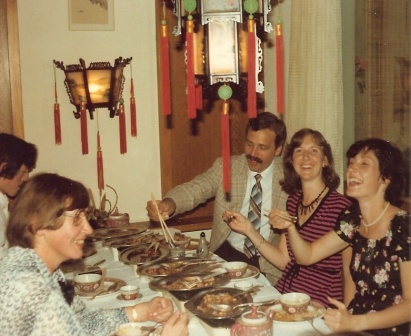
In the spring of 1981 we took a vacation and travelled to Greece. What a wonderful place that country is! Warm, sunny, friendly. Such a contrast to Switzerland, where it had been cold and dreary for many months. Since our marriage I had tried to get Dave to like okra. When we were married, a woman had advised me "Serve something new to him 3 times, and if he doesn't like it after that, forget it." So I had tried okra in 3 different ways, but he just couldn't get the hang of eating this wonderful southern food. At our first meal in a restaurant in Greece, they automatically put steamed okra on each plate. Dave devoured it, raving about how wonderful it was. "What is this?" he asked me across the table. "It's okra!" I was so happy; my husband had been converted and finally we could eat okra in our home!
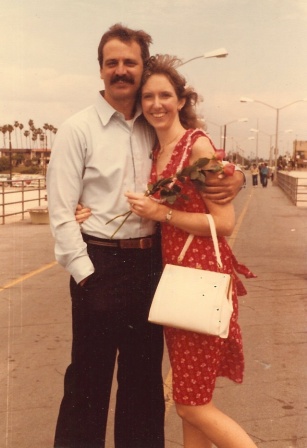
While in Greece, I had an acute flare of my rheumatoid arthritis. Our trip was cut short, and we came back to Basel, going directly into the hospital. There I suffered much for several weeks. One of my best friends, a dear lady named Erika, came to visit me and she told me later, "You looked like an angel" (meaning, you looked like you were dead). I certainly felt dead, I was so weak. But God raised me up again, and used the experience to convince Dr. Reicke that we should return to the USA for the remainder of Dave's research and writing.
Our last day in Switzerland, Herr and Frau Schaub invited us for a day trip to Alsace, France. The night before our trip Herr Schaub braved the one and only McDonalds in Basel to buy us some hamburgers. Every Friday night we splurged to go to McDonalds; it was the only non-smoking restaurant in Basel, and it was the only place that served hamburgers. Ground meat was considered dog food by the Swiss; only the Italians living in Switzerland bought ground meat in the grocery store. It was truly an act of love that Herr Schaub stooped to enter McDonalds. And at our picnic lunch in Alsace the next day, he proudly produced the two hamburgers he had purchased the day before!
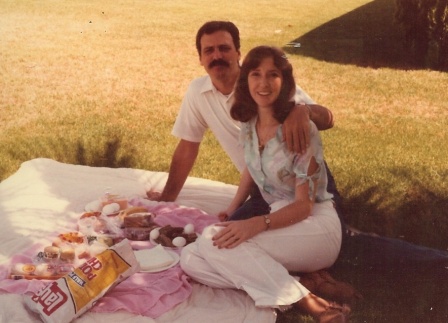
After our departure from Basel, the Schaubs left the little Baptist church; their hearts of bitterness seemed to finally catch up with them, and from all appearances they forsook the Lord Jesus who loved them throughout the War. Only He knows if they are in His Home now, but the Scriptures are clear that the reward of salvation goes to the faithful. If we start with Him, but we forsake Him in favor of comfort, or pleasure, or education, or even self-pity, then our reward is lost. One of my greatest prayers for me and others is that the Lord would make us to be faithful all the way to the end.
So in summer of 1981 we returned to southern California, two years ahead of schedule. We settled into the Tropicana Apartments in La Mirada. The dinette table in our dining room was turned into Dave's writing desk, and we put a 4 by 4 folding table in a corner of the living room for our eating table. I returned to working as a nurse, and Dave also returned to teaching Greek at Biola College.
The prospect of children began to look bright. I have always loved children. My mother is a natural when it comes to children, and in that way I was much like her. So as Dave worked in earnest on his dissertation, writing Paul, Apostle of Weakness (a study of the Greek word "weakness" in Paul's writings), I began to pray about the next phase in my life: motherhood.
There were two things of big concern to me. First, I absolutely did not want to raise a family in an apartment. "Please, Lord, put us in a house before sending me children!" And second, I wanted to have my first child before I turned 30 years of age.
I'll never forget the first day we went house-hunting. We had decided to settle in southern California, it being half-way between Hawaii and Texas. And since Dave's teaching at Biola looked certain for the long-term, we decided to buy in the La Mirada area. That first day we met a realtor and looked at several tract homes. By the third house, we abandoned the effort. We were in complete, utter shock, so much so that we literally could not speak! The condition of the houses and the price tags were beyond belief!
For a whole year, we could not bring ourselves to even mention the idea of a house. Then, in summer 1982, we began to look again. We found a house that was at the top of the Whittier Hills; I loved it! It was the last house before the rugged, undeveloped Hills, and I felt that I could (in a sense) return to my Ethiopia if we lived there. But Dave did not want to be that far from the College; he felt we should buy within walking distance of the College, so that students could walk over to our house. Boy, did I struggle with the Lord over that one! "Lord, I'll submit to my husband. I'll look for houses in La Mirada, but don't You dare give us one of those tract houses!"
Then one Sunday as we were exiting the church parking lot, we saw an "Open House" sign for a house just across the street. We stopped in and met Wanda the real estate agent. The house was not at all what we were looking for; it was a "zero lot," multi-storey, on a busy street. But when we told her our dream house, it just so happened that one matching our description had come on the market. It was in an "Agricultural" zone of the city, where lots were 1/3 to 1 acre in size! This was an old farm house that had been expanded and updated. There were 21 fruit trees and a vegetable garden. In those days, most homes in the Los Angeles area had solid walls (usually cement block) around their yards, but in this neighborhood, all the fences were chain link, so we had a sense of open country. I was SO excited! And silently, I thanked the Lord for hearing my heart and giving me a home that accommodated both Dave's desire to be close to school, and also my desire to have something roughly resembling the open countryside of Ethiopia. Our primary mortgage was an adjustable-rate mortgage. This was a new animal; never before had the mortgage industry offered adjustable-rate mortgages. But they had learned their lesson. The inflation rate was 13%, but the fixed-rate mortgages on their books didn't come close to that figure! Everyone predicted that fixed-rate mortgages were a thing of the past. Because of my working and the savings we still had left over from Switzerland, after paying 20% down, we were able to qualify for a first mortgage at 16.50% and a second mortgage carried by the sellers at 10%. The sale price of the house was $125,000.
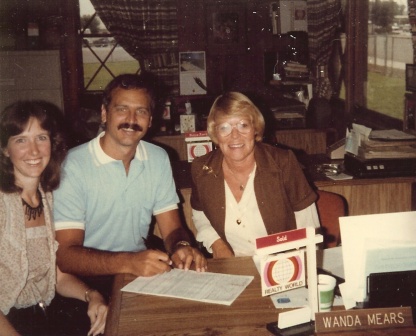
Within 3 weeks of moving into our first house, our first child was conceived. The due date was April 26th, exactly 15 days before my 30th birthday!
September 11, 2013